Maui Economic Opportunity: A Life Changer
Alfredo G. Evangelista | Assistant Editor
Helping People. Changing Lives. This phrase appears prominently on Maui Economic Opportunity (MEO)’s website. This month, MEO celebrates fifty-eight years of serving the County of Maui.

When President Lyndon B. Johnson gave his first State of the Union address as president on January 8, 1964 after he ascended to the presidency due to the assassination of President John F. Kennedy, Johnson focused on poverty in the United States. At that time, almost 20 percent of Americans were deemed to be in poverty.
“This administration today here and now declares unconditional war on poverty in America. I urge this Congress and all Americans to join me in that effort … Poverty is a national problem, requiring improved national organization and support. But this attack, to be effective, must also be organized at the State and local level. For the war against poverty will not be won here in Washington. It must be won in the field, in every private home, in every public office, from the courthouse to the White House. Very often, a lack of jobs and money is not the cause of poverty, but the symptom. Our aim is not only to relieve the symptoms of poverty but to cure it—and above all, to prevent it. No single piece of legislation, however, is going to suffice.”
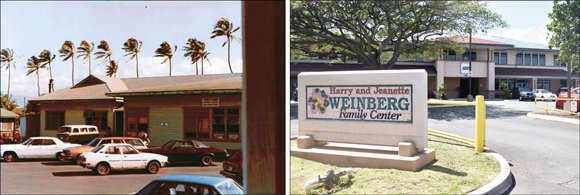
Photos courtesy MEO
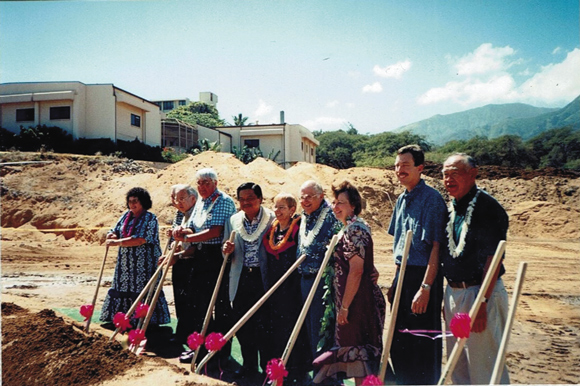
Photo courtesy MEO
In March 1964, Johnson presented his legislation titled the Economic Opportunity Act of 1964 and Congress approved the bill that summer. Johnson signed the bill into law on August 20, 1964. As a result of the new law, local Community Action Agencies were formed as a key component of the War on Poverty.
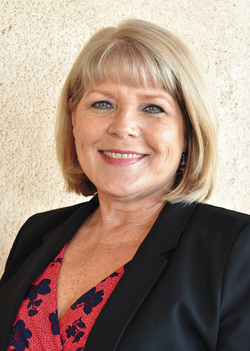
Photo courtesy MEO
MEO was granted its Charter on March 22, 1965 “to serve the low-income, elderly and handicapped persons” and is the only designated anti-poverty Community Action Agency serving Maui County. “MEO connects individuals and families to greater opportunity, transforming their lives and making our community stronger with services located in the areas of greatest need. When a family or an individual faces a crisis, MEO is able to respond quickly with targeted forms of assistance appropriate to the situation. This may include the mobilization of help from our many private sector partners, volunteers, and faith-based groups,” explains Debbie Cabebe, the current Chief Executive Officer of MEO.
Six others have been in charge of MEO prior to Cabebe: Elizabeth “Jonesie” Medeiros, Joe Souki, Paul Pladera, Gladys Baisa, Sandy Baz and Lyn McNeff.
Baisa began with MEO in 1969 as a fiscal officer. “I was called by Mayor Elmer Cravalho who told me Joe Souki was looking for his first Finance Director,” recalls Baisa. “At that time, I was working at Maui Memorial Hospital but I had a lot of respect for the Mayor so I decided I would apply for the job. We had a lot of grants coming in from the federal government and a fiscal officer was needed to keep things straight and to comply with all the grant conditions.”
Baisa became Executive Director in 1984 and served until December 2005. She served MEO for a total of thirty-eight years with twenty-one years as Executive Director. “Medeiros was on loan from the Department of Education for a year. She hired Souki who went out into the communities to organize disadvantaged and poor people by first identifying their needs and making sure programs were created to meet those needs,” says Baisa. “When Souki became Executive Director, he was very creative and innovative. For example, he came up with the concept of Meals on Wheels. He even started a little van service which became the start of MEO’s bus program. He also started the Headstart program on Maui.” Souki also started the senior clubs, according to Baisa.
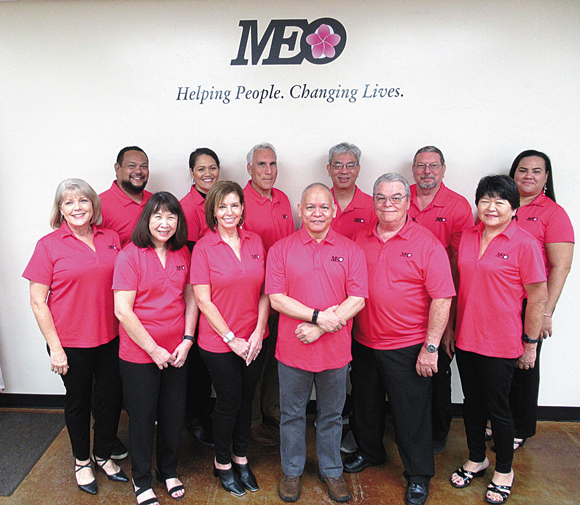
Photo courtesy MEO
During her years, Baisa started the BEST (Being Empowered and Safe Together) program which is designed to assist inmates to successfully reintegrate into society. MEO was a federal Migrant & Seasonal Farmworker Program (MSWP) grantee since the 1970s. In 1990, responding to a request from the local Agricultural Industry during the ag worker crisis, which resulted from many local workers switching to work in the visitor industry, Baisa reached out to her fellow MSWP grantees in mainland states and brought in hundreds of unemployed and underemployed Hispanic workers who were legally in the United States, to work at Maui Pine and Del Monte. The program saved Maui’s pineapple industry at that time.
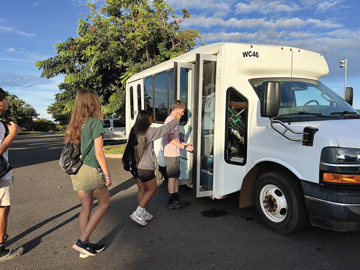
Photo courtesy MEO
“The Mission of MEO is to strengthen the community while helping people in need restore their hope, reach their potential and enrich their lives,” Cabebe states. “The goal is to promptly stabilize a family or individual, and thus avoid the long-term consequence of costly public dependency. MEO also has the capability to sustain long-term involvement in a family’s progress to self-sufficiency, as well as in the development of the low-income community.”
Currently, MEO provides tools to help people and change lives through five departments: Business Development Center, Community Services, Early Childhood Services, Transportation Services and Youth Services.
The Business Development Center assists small business entrepreneurs with developing a business plan, start-up and expansion education, credit assessment, and microloans.
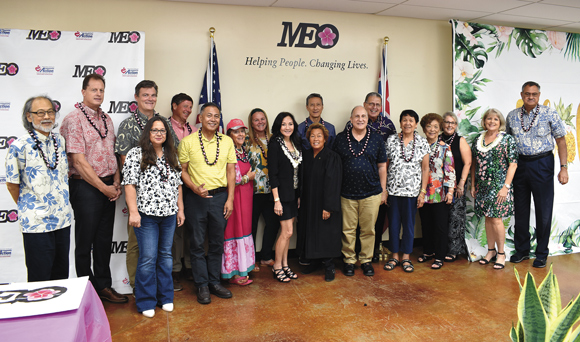
Photo courtesy MEO
Community Services provides a wide array of services, including employment training and job placement; acculturation and advocacy for the Hispanic/Latino community; rental, weatherization and energy assistance; senior club coordination, including education and advocacy, providing seniors with access to fresh fruits and vegetables; reintegration for returning citizens; and more.
Early Childhood Services provides quality early childhood education to children twelve months to five years of age, including Head Start comprehensive services to eligible children and families.
The Transportation Department provides rides to the doctor, work, school, and adult day care, and for necessary shopping and other needs with both standard and wheelchair-lift-equipped vehicles. MEO also operates The Maui Bus ADA paratransit service.
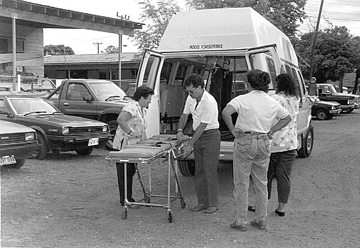
Photo courtesy MEO
The Youth Services Department provides youth with assistance to succeed in school and life through fun-filled opportunities. They learn life skills that prepare them for the workforce and to serve the community. Prevention of underage drinking, substance abuse, tobacco use and teenage pregnancy, as well as a teenage suicide curriculum and activities, are consistently blended with youth program activities.
Over its fifty-eight-year existence, there are many success stories, including Nicanor Saladino who arrived from the Philippines in October 2015. While in the Philippines, Saladino received his Bachelor of Science in Agriculture Engineering from Mariano Marcos State University and also was an owner of two businesses. When he arrived on Maui, he started working at Monsanto but was laid off in March 2016.
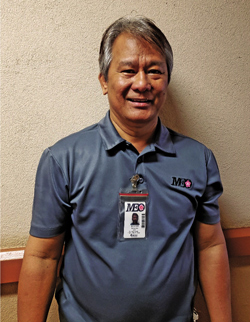
Photo courtesy MEO
Saladino sought assistance from MEO through its National Farmworker Jobs Program (NFJP). Saladino was hired as an auto detailer at Kīhei Auto Sales and MEO NFJP assisted with support services for transportation, housing/rental assistance and auto renewal registration. Saladino was also able to enroll in several computer classes at the University of Hawai‘i Maui College (UHMC). Saladino soon expressed interest in Photovoltaic Electrical Technology and Water Purification and through MEO NFJP, he received certifications in the entry level Photovoltaic Design and Installation course, the OSHA General Industry course and the Certified Supply Green Supply Chain Professional course. Later, Saladino applied for MEO’s Energy Educator for Weatherization Assistance Program (WAP) and he received a certificate of completion from Case Management Courses. Today, Saladino works with the MEO WAP and as a Rental Assistance Program (RAP) case manager.
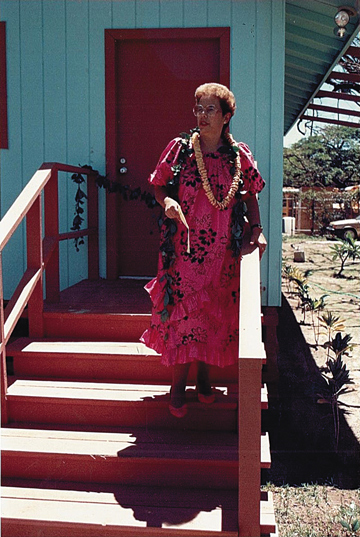
Photo courtesy MEO
The Rental Assistance Program is where Cynthia and Mitchell Catugal sought assistance from MEO. The Catugals’ longtime rental was being terminated and the Catugals faced being homeless. Even though both of them held full-time jobs, the Catugals were in a financial bind. Through Craigslist, they found a unit allowing animals but it cost more than they could afford. MEO provided the Catugals with their rent and utility deposits, first month’s rent and monitored their progress for a year as part of the Rental Assistance Program. To receive assistance, they were required to take MEO Business Development Center’s Financial Literacy class. With their housing secured, they turned their attention to improving their credit scores and saving to purchase the unit. Earlier, they asked their landlord if they could purchase the unit if it ever went on the market. When it did, the landlord offered the unit to the Catugals and with help from family, they were able to close the deal. With prices rising and both in their 60’s, this was the last opportunity for the Catugals to own a home.
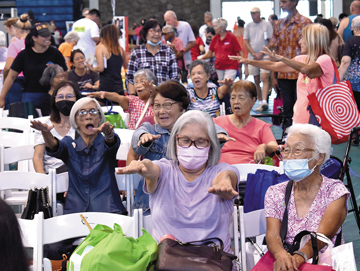
Photo courtesy MEO
One of the beneficiaries of the BEST program is Eddie Rodriguez who was set to be released on parole in early 2021. Rodriguez planned to return to Florida but the pandemic stopped all his travel plans. MEO stepped in and provided Rodriguez with a unit at the Ka Hale A Ke Ola shelter so he could be released on parole. MEO helped Rodriguez with his transition and helped him gather his necessities and gave him a cellphone and clothes to put on his back. MEO also assisted with Rodriguez’ resume and steered him to employment possibilities. Through MEO’s BEST program, the CARES Act program and the Employment program, Rodriguez was able to save money and send money to his kids and still have left over funds. He was definitely given a head start through MEO.
“I hate asking for help. I don’t like being helped. Normally, I do things on my own my whole life,” clarifies Rodriguez. “But I learned to be humble and just accept the help. Take it while I can. It’s there for a reason. And so I did! I took the help. I met some good people with good intentions. And I am grateful for that! The help is there. The programs work. But the only way it works is if you yourself is trying. It works but you have to work with it.”
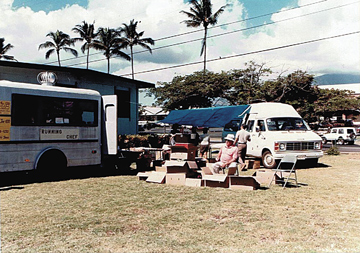
Photo courtesy MEO
“MEO has been a godsend,” affirms Cynthia Catugal. “MEO has been one of the best things to happen to the County of Maui from transportation services to everything they offer, small business help, rental assistance, everything. It’s just an awesome, awesome program.”
“Amazing! I can’t imagine my life without the great help MEO NFJP has provided for me, it seems like a dream come true!” exclaims Saladino. “My life was difficult when I came to Hawai‘i and MEO NFJP opened up an opportunity for a new beginning. It equipped me with the knowledge and training for my future (career).”
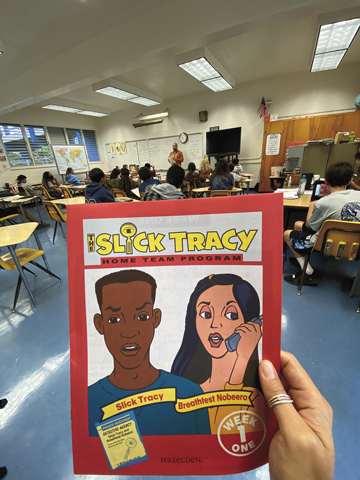
Photo courtesy MEO
Recently, MEO partnered with Hale Mahaolu to develop affordable housing. “What MEO is doing about creating housing is really fulfilling their true Mission. MEO is more than a nonprofit; it was created through legislative action to help solve the problems of the unrepresented,” asserts Baisa.
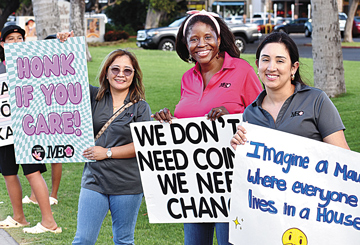
Photo courtesy MEO
“Helping People. Changing Lives. That’s the motto that drives us at MEO,” concludes Cabebe. “There is no greater joy than to see people coming to us in difficult times and working to improve themselves and thrive. Living in Hawai‘i, families are one job loss, illness or family emergency away from financial problems and homelessness. MEO is here in your time if need as a safety net ready to help.”
 Alfredo G. Evangelista is a graduate of Maui High School (1976), the University of Southern California (1980), and the University of California at Los Angeles School of Law (1983). He is a sole practitioner at Law Offices of Alfredo Evangelista, A Limited Liability Law Company, concentrating in estate planning, business start-up and consultation, nonprofit corporations, and litigation. He has been practicing law for 39 years (since 1983) and returned home in 2010 to be with his family and to marry his high school sweetheart, the former Basilia Tumacder Idica.
Alfredo G. Evangelista is a graduate of Maui High School (1976), the University of Southern California (1980), and the University of California at Los Angeles School of Law (1983). He is a sole practitioner at Law Offices of Alfredo Evangelista, A Limited Liability Law Company, concentrating in estate planning, business start-up and consultation, nonprofit corporations, and litigation. He has been practicing law for 39 years (since 1983) and returned home in 2010 to be with his family and to marry his high school sweetheart, the former Basilia Tumacder Idica.
He first met Gladys Baisa in 1986 when, at the instruction of Elmer Cravalho, he asked Baisa to head the Benjamin Cayetano Maui campaign for Lt. Governor.
